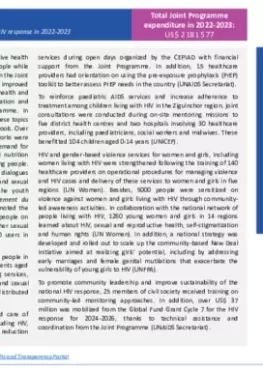|
Senegal
Senegal continued to scale up HIV and sexual and reproductive health (SRH) education and services for adolescents and young people while addressing gender-based violence with strategic support from the Joint Programme. Over 304 000 adolescents and young people improved their literacy of prevention of HIV, sexual and reproductive health and sexually transmitted infections through information, education and communication initiatives supported by the Joint Programme. In addition, more than 277 000 young people learned about these topics through sexual and reproductive health education in 368 schools. Over 2000 young people including representatives of youth networks were trained to improve their awareness-raising skills, creating demand for and blogging about HIV, sexual and reproductive health and nutrition via social media platforms and promotion projects for young people. Over 1400 young girls and boys also took part in educational dialogues aimed at promoting change in social norms related to HIV and sexual and reproductive health (UNFPA). In partnership with the youth association Réseau de jeunes en population et développement du Sénégal (RESOPOPDEV), various social media activities promoted the newly launched Hello Ado app aimed at informing young people on family planning, HIV, sexually transmitted infections and other sexual and reproductive health topics; the app gained over 3700 users in seven months (UNESCO).
The Joint Programme’s support further helped reach young people in rural and hard-to-reach areas, with more than 5000 adolescents aged 15-24 years receiving voluntary HIV counselling and testing services, nearly 23 000 accessing HIV, sexually transmitted infection, and sexual and reproductive health services, and over 37 800 condoms distributed (UNFPA).
A total of 250 clients at the Dakar centre for integrated care of addictions (CEPIAD) were sensitized on various topics, including HIV, and 78 women who use drugs accessed HIV testing and harm reduction services during open days organized by the CEPIAD with financial support from the Joint Programme. In addition, 15 healthcare providers had orientation on using the pre-exposure prophylaxis (PrEP) toolkit to better assess PrEP needs in the country (UNAIDS Secretariat).
To reinforce paediatric AIDS services and increase adherence to treatment among children living with HIV in the Ziguinchor region, joint consultations were conducted during on-site mentoring missions to five district health centres and two hospitals involving 30 healthcare providers, including paediatricians, social workers and midwives. These benefitted 104 children aged 0-14 years (UNICEF).
HIV and gender-based violence services for women and girls, including women living with HIV were strengthened following the training of 140 healthcare providers on operational procedures for managing violence and HIV cases and delivery of these services to women and girls in five regions (UN Women). Besides, 5000 people were sensitized on violence against women and girls living with HIV through community-led awareness activities. In collaboration with the national network of people living with HIV, 1260 young women and girls in 14 regions learned about HIV, sexual and reproductive health, self-stigmatization and human rights (UN Women). In addition, a national strategy was developed and rolled out to scale up the community-based New Deal initiative aimed at realizing girls’ potential, including by addressing early marriages and female genital mutilations that exacerbate the vulnerability of young girls to HIV (UNFPA).
To promote community leadership and improve sustainability of the national HIV response, 25 members of civil society received training on community-led monitoring approaches. In addition, over US$ 37 million was mobilized from the Global Fund Grant Cycle 7 for the HIV response for 2024-2026, thanks to technical assistance and coordination from the Joint Programme (UNAIDS Secretariat).





